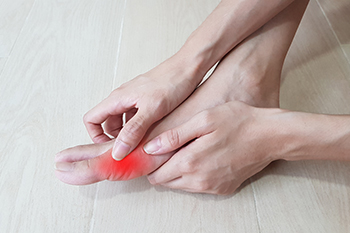
Gout is a form of arthritis that often targets the big toe, causing sudden, intense pain, swelling, and redness in the joint. This happens when uric acid crystals build up in the joints, leading to inflammation. During a gout attack, the affected joint, especially the big toe, can become extremely painful, making even light contact unbearable. Treatment focuses on relieving the pain and inflammation quickly, usually with medications like NSAIDs, colchicine, or steroids. These are most effective when taken as soon as the attack begins. To prevent future flare-ups, a podiatrist may prescribe medication that lowers uric acid levels in the blood, helping to dissolve the crystals and prevent new ones from forming. Restricting intake of certain foods that contribute to uric acid build up is also important. A podiatrist can diagnose gout and offer effective treatments to manage both the immediate pain and long-term prevention. If you are experiencing pain from gout, it is suggested that you schedule an appointment with a podiatrist.
Gout is a painful condition that can be treated. If you are seeking treatment, contact Dr. John Branwell from Kearny, New Jersey. Our doctor will treat your foot and ankle needs.
What Is Gout?
Gout is a form of arthritis that is characterized by sudden, severe attacks of pain, redness, and tenderness in the joints. The condition usually affects the joint at the base of the big toe. A gout attack can occur at any random time, such as the middle of the night while you are asleep.
Symptoms
- Intense Joint Pain - Usually around the large joint of your big toe, and it most severe within the first four to twelve hours
- Lingering Discomfort - Joint discomfort may last from a few days to a few weeks
- Inflammation and Redness -Affected joints may become swollen, tender, warm and red
- Limited Range of Motion - May experience a decrease in joint mobility
Risk Factors
- Genetics - If family members have gout, you’re more likely to have it
- Medications - Diuretic medications can raise uric acid levels
- Gender/Age - Gout is more common in men until the age of 60. It is believed that estrogen protects women until that point
- Diet - Eating red meat and shellfish increases your risk
- Alcohol - Having more than two alcoholic drinks per day increases your risk
- Obesity - Obese people are at a higher risk for gout
Prior to visiting your podiatrist to receive treatment for gout, there are a few things you should do beforehand. If you have gout you should write down your symptoms--including when they started and how often you experience them, important medical information you may have, and any questions you may have. Writing down these three things will help your podiatrist in assessing your specific situation so that he or she may provide the best route of treatment for you.
If you have any questions, please feel free to contact our office located in Kearny, NJ . We offer the newest diagnostic and treatment technologies for all your foot care needs.
